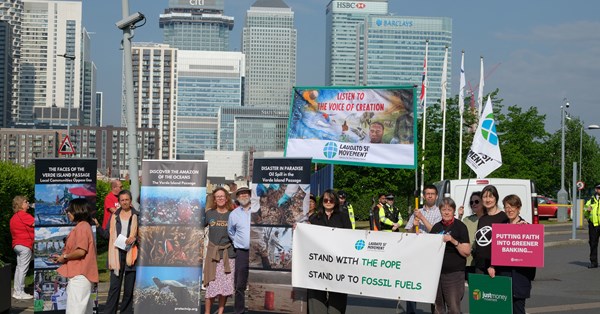CHRISTIAN organisations, stepping up their pressure on high-street banks to end the financing of fossil-fuel projects, made new demands of HSBC last week.
At the banking corporation’s annual meeting in London on Friday was Rosie Venner, director of movement-building at the JustMoney Movement, an ecumenical charity campaigning on financial ethics.
“AGM activism — where shareholders attend an AGM and ask questions of the company leadership — is an important tool for holding companies to account,” she said. “Churches that want to bank in line with their values are starting to leave HSBC in search of greener banks. We want to ensure their voices are heard by HSBC’s board of directors.”
In November, more than 70 religious organisations, including the Methodist Church in Britain, the Scottish Episcopal Church’s College of Bishops, and the Iona Community wrote to HSBC to express concern about its financing of fossil-fuel projects in view of the climate crisis (News, 19 November 2024).
The Laudato Si’ Movement is also backing the campaign. The manager of its climate-finance campaign, James Buchanan, said: “Major oil and gas companies are continuing to explore for new fossil-fuel reserves, despite the UN and International Energy Agency urging them to change course, and high-street banks such as HSBC and Barclays are financing this fossil-fuel expansion. We call on HSBC and major high-street banks to stop, and encourage Christian individuals and institutions to accelerate the clean-energy transition by moving their money to more ethical banks.”
The Banking on Climate Chaos Report 2024 ranks HSBC among the top ten banks providing finance for significant fossil-fuel projects between 2016 and 2023. The International Energy Agency (IEA) has stated that fossil-fuel expansion is incompatible with achieving a goal of net-zero emissions by 2050.
A number of C of E churches and cathedrals have already cut ties with banks that finance the fossil-fuel industry. The cathedrals of Worcester, Durham, Truro and Southwark have joined those of Sheffield, Chelmsford, and Derby in committing themselves to moving arrangements elsewhere (News, 18 February).
Churches Together in Britain and Ireland (CTBI) has also supported the campaign. “In their work for climate justice, the Churches and Christian organisations in our membership have been examining their own actions and choices, including in the area of banking and finance,” the general secretary of CTBI, Nicola Brady, said. “We appeal to banks to become partners in the work of climate justice. Their influence and leadership is critical in the work of building a just and sustainable future for all and we are keen to support and encourage them to take the necessary steps to achieve this.”
HSBC’s energy policy, which sets out what the bank will and will not finance, was last reviewed in February. The document concludes: “HSBC recognises the importance of balancing all energy interests — energy transition, energy security, energy affordability and economic development — which are increasingly converging around a clean energy future. Our approach is to prioritise real world emission reductions as we support our clients in delivering the energy transition alongside security of supply. Fundamentally, we will continue to support energy clients that take an active role in the energy transition and who apply relevant robust industry standards.”
Joe Ware is senior climate journalist at Christian Aid
















